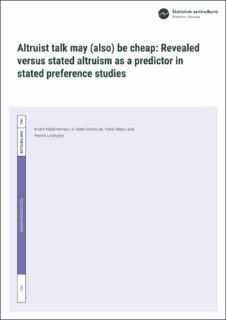Altruist talk may (also) be cheap: Revealed versus stated altruism as a predictor in stated preference studies
Working paper
Permanent lenke
https://hdl.handle.net/11250/2767182Utgivelsesdato
2021-04Metadata
Vis full innførselSamlinger
- Discussion Papers [1003]
Sammendrag
Altruistic preferences of various forms may cause difficulties in welfare economics. In the valuation of public goods, such preferences are believed to help explain the substantial non-use values found in many stated preference (SP) valuation surveys. However, studies analysing the effect of altruism on willingness to pay (WTP) have underappreciated the challenges in measuring altruism by the stated measures typically used. Instead, we exploit a naturally occurring decision domain to investigate the role of altruism in SP. We make use of an Internet survey company’s data on respondents’ donations of earned survey coins to charities to analyse the effect of donation behaviour on WTP across two contingent valuation (CV) surveys on different environmental topics. Hence, donators in our data are proven givers of their own money in an anonymous and unrelated setting, a decision much like the anonymous dictator game with earned resources. We find that respondents’ past donations are associated with higher WTP in the CV surveys, also when controlling for stated altruism, ecological and environmental attitudes, and respondent characteristics. The strong association between past donations and higher WTP imply that altruism is an even more important factor in explaining the substantial non-use values found in SP than assumed. The results also support prior research finding altruistic behaviour in one decision domain to be a good predictor of altruistic behaviour in other domains. Combining past behaviour with preference elicitation opens new avenues of research to better understand and handle altruistic preferences in SP and welfare economics.

